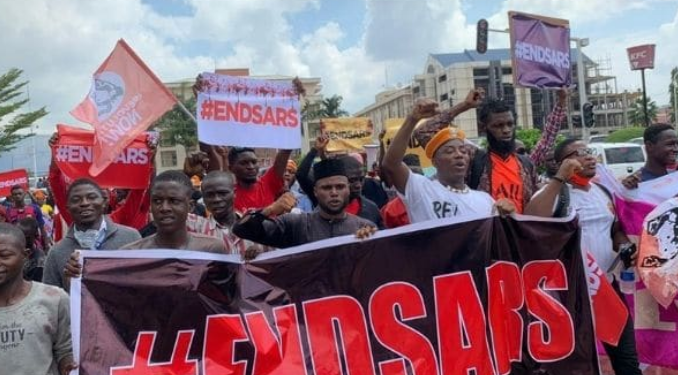
We applaud the #EndSARS movement for its consistency in demanding an end to police brutality and championing reform of the Nigeria Police – a demand which has been trending since 2017.
The most recent peaceful protests (October 8 – 20 2020) captured the imagination, pride, and support of millions of Nigerians across the world and have provided a new model for organizing peaceful protests that will be studied for years to come.
The protest and protesters were well organized, organic, empathetic, and provided a strong and inspiring narrative of Nigerians being unified, caring, and giving. Some of the approaches employed included providing: whistles for female protesters to sound the alarm in case of trouble, looking after and returning missing items, traffic wardens watered and fed, and over 500 lawyers volunteering to represent and seek the release of protesters from jail. We applaud the horizontal leadership structure of the protests which confused the old-guard looking for leaders to compromise and which drew the ire of those out of touch with the evolving nature of leading protests grounded in social justice, successfully used in Hong Kong and Belarus. This is the future and young Nigerians, are in tune.
The five demands of the #EndSARS movement are: (i) immediate release of all Nigerians arrested and being detained for exercising their constitutional rights; (ii) justice for all victims of police brutality and negligence and appropriate compensation; (iii) set up of an independent body to oversee the investigation and prosecution of all reports of police misconduct; (iv) psychological evaluation and retraining of all disbanded SARS officers before they can be redeployed; and (iv) increasing police salary so that our police are adequately compensated for securing our safety.
Police reform has been a constant feature of Nigeria’s democracy and Nigerians relationship with oppressive governments and governments unwillingness to meet the logical, and justified demands of Nigerians speak to a deeper malaise in our society: impunity, disdain for citizens, and governance structures designed to exploit. Since colonial times, the general ethos of the police has not changed. However, with the Police Act 2020 which puts protection of human rights at the core of its mandate, there might be an opportunity to ensure meaningful reforms in the Nigeria Police if the Act is properly interpreted, implemented, and operationalized.
The government cannot shy away from properly funding, equipping, training, and supporting appropriate accountability processes in the Nigeria Police, if the organization and its personnel are to be effective. This should be complemented by ensuring systematic justice where we normalize punishing erring police officers who arrest, kill, and rob innocent Nigerians and pay damages routinely to families of victims and survivors, this will help create narratives of a just nation that we sorely need.
This administration has the opportunity to build the foundation blocks for a culture of justice in Nigeria by (i) meeting the five demands of the #EndSARS protesters (ii) tasking the presidential panel on police reform to start with the existing reports on police reform, including ensuring the recommendations of the National Human Rights Commission are executed, (iii) providing an independent investigation into the conduct of the Nigerian military and Nigeria Police at the Lagos Lekki Toll Gate on 20.10.2020, (iv) ensuring an immediate end to arbitrary arrests and daily brutalization of Nigerians and (vi) protecting freedom of speech and valuing social media for its ability to serve as an early warning on the mood of the largest demographic in Nigeria.
The loss of lives over the last few weeks is tragic and inexcusable and our sympathies are with the families and friends of all victims. While the destruction of property was unnecessary and irresponsible, the states and federal governments must take responsibility and pay compensation for the losses suffered by private citizens. Nigerian governments must do the right thing.
Princess Hamman-Obels, Idayat Hassan, ‘Kemi Okenyodo, and Ayisha Osori wrote on behalf of Alternative Voices for a Better Nigeria.
END

Be the first to comment